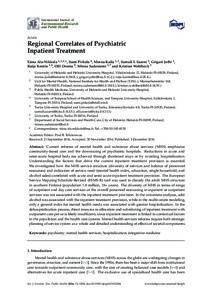Regional Correlates of Psychiatric Inpatient Treatment
Kontio R; Pirkola S; Joffe G; Sadeniemi M; Kaila M; Ala-Nikkola T; Saarni SI; Wahlbeck K; Oranta O
Regional Correlates of Psychiatric Inpatient Treatment
Kontio R
Pirkola S
Joffe G
Sadeniemi M
Kaila M
Ala-Nikkola T
Saarni SI
Wahlbeck K
Oranta O
MDPI AG
Julkaisun pysyvä osoite on:
https://urn.fi/URN:NBN:fi-fe2021042716577
https://urn.fi/URN:NBN:fi-fe2021042716577
Tiivistelmä
Current reforms of mental health and substance abuse services (MHS) emphasize community-based care and the downsizing of psychiatric hospitals. Reductions in acute and semi-acute hospital beds are achieved through shortened stays or by avoiding hospitalization. Understanding the factors that drive the current inpatient treatment provision is essential. We investigated how the MHS service structure (diversity of services and balance of personnel resources) and indicators of service need (mental health index, education, single household, and alcohol sales) correlated with acute and semi-acute inpatient treatment provision. The European Service Mapping Schedule-Revised (ESMS-R) tool was used to classify the adult MHS structure in southern Finland (population 1.8 million, 18+ years). The diversity of MHS in terms of range of outpatient and day care services or the overall personnel resourcing in inpatient or outpatient services was not associated with the inpatient treatment provision. In the univariate analyses, sold alcohol was associated with the inpatient treatment provision, while in the multivariate modeling, only a general index for mental health needs was associated with greater hospitalization. In the dehospitalization process, direct resource re-allocation and substituting of inpatient treatment with outpatient care per se is likely insufficient, since inpatient treatment is linked to contextual factors in the population and the health care system. Mental health services reforms require both strategic planning of service system as a whole and detailed understanding of effects of societal components.
Kokoelmat
- Rinnakkaistallenteet [19250]
